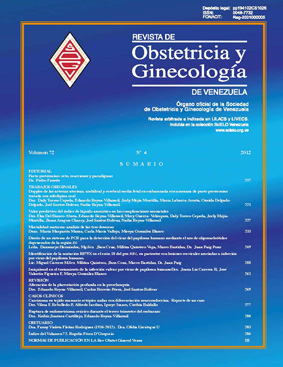Conocimiento y actitudes sobre el virus de papiloma humano y su vacuna en adolescentes
Palavras-chave:
Virus del Papiloma Humano, Vacuna, Conocimiento, Actitud, Adolescentes, Human Papillomavirus, Vaccine, Knowledge, Attitudes, AdolescentResumo
Determinar el conocimiento y actitudes sobre el virus de papiloma humano y la vacuna en una poblaciónde adolescentes. Se encuestaron adolescentes o estudiantes de sexo femenino de tercer al quinto año de bachillerato de laUnidad Educativa Los Álamos, en Maracaibo, estado Zulia. Se analizaron 107 encuestas. Setenta y cuatro adolescentes (69,2 %) respondieron que habían oído sobreel virus de papiloma humano, 68,9 % de las jóvenes tenían 15 años o menos, 39,3 % sabían que es la enfermedadde transmisión sexual más común y 33,6 % sabía que produce la verruga genital o condiloma acuminado. Solo29 % mencionaron que sabían sobre la relación entre el virus y el cáncer del cuello uterino. Veintinueve por cientomencionó que sabía de la existencia de la vacuna contra el virus de papiloma humano, 86 % respondieron quela colocación de la vacuna contra el virus de papiloma humano era beneficiosa y 84,1 % dijeron que la vacunano incitaba al inicio de las relaciones sexuales a edades tempranas y a la promiscuidad sexual. Noventa y nueveadolescentes (92,5 %) estaban dispuestas a colocarse la vacuna y todas mencionaron que el estado debería cubrirel costo de la misma. Un importante porcentaje de las adolescentes saben que es el virus de papiloma humano, pero elnivel de conocimiento es bajo. Un porcentaje importante están dispuestas a vacunarse.
To determine the knowledge and attitudes about human papillomavirus and the vaccine in a populationof adolescents. Surveyed teenagers or students of female sex from the ninth to the eleventh grade of the Los Alamoseducation unit, in Maracaibo, Zulia. 107 surveys were analyzed. Seventy-four teenagers (69.2%) responded that they had heard about the humanpapillomavirus, 68.9% of girls had 15 years or less, 39.3% knew that it is the most common sexually transmitteddisease and 33.6% knew that it produces the genital wart. Only 29% mentioned that they knew about the relationshipbetween the virus and cancer of the cervix. Twenty-nine percent mentioned that he knew of the existence of thevaccine against the human papillomavirus, 86% responded that the placement of the vaccine against the humanpapillomavirus was beneficial and 84,1% said that vaccine not inciting the beginning of sexual intercourse at anearly age and sexual promiscuity. Ninety-nine teenagers (92.5%) were willing to take the vaccine and all mentionedthat the State should cover the cost thereof. A significant percentage of adolescent girls know the human papilloma virus, but the level ofknowledge is low. A large percentage is willing to be vaccinated

